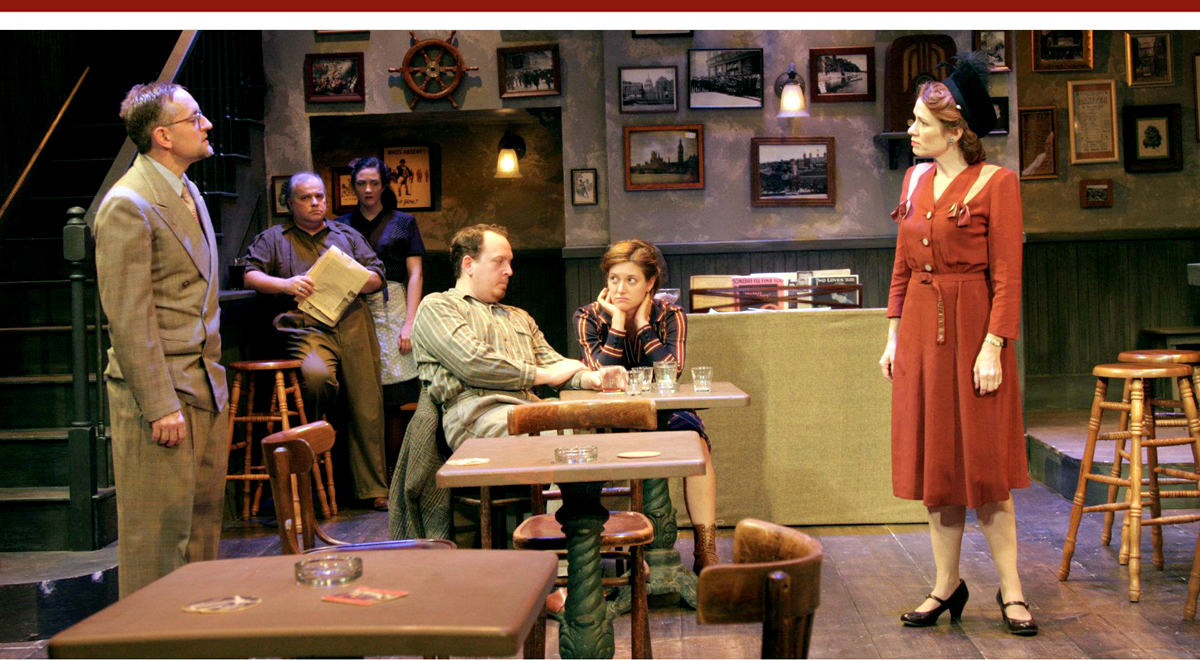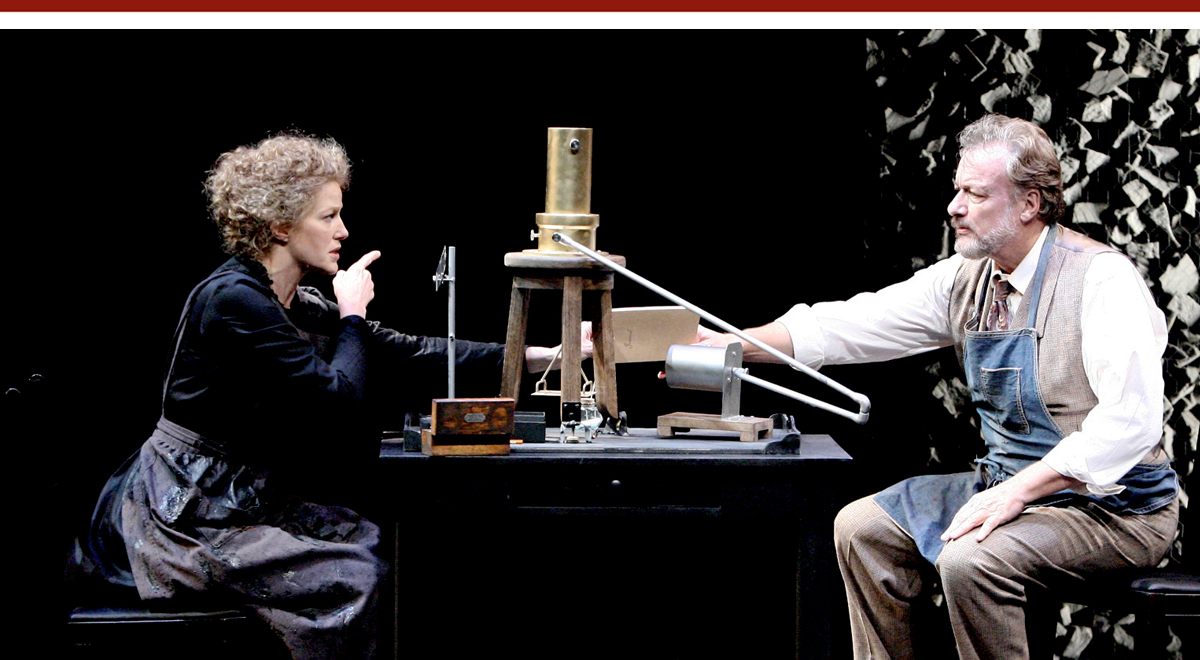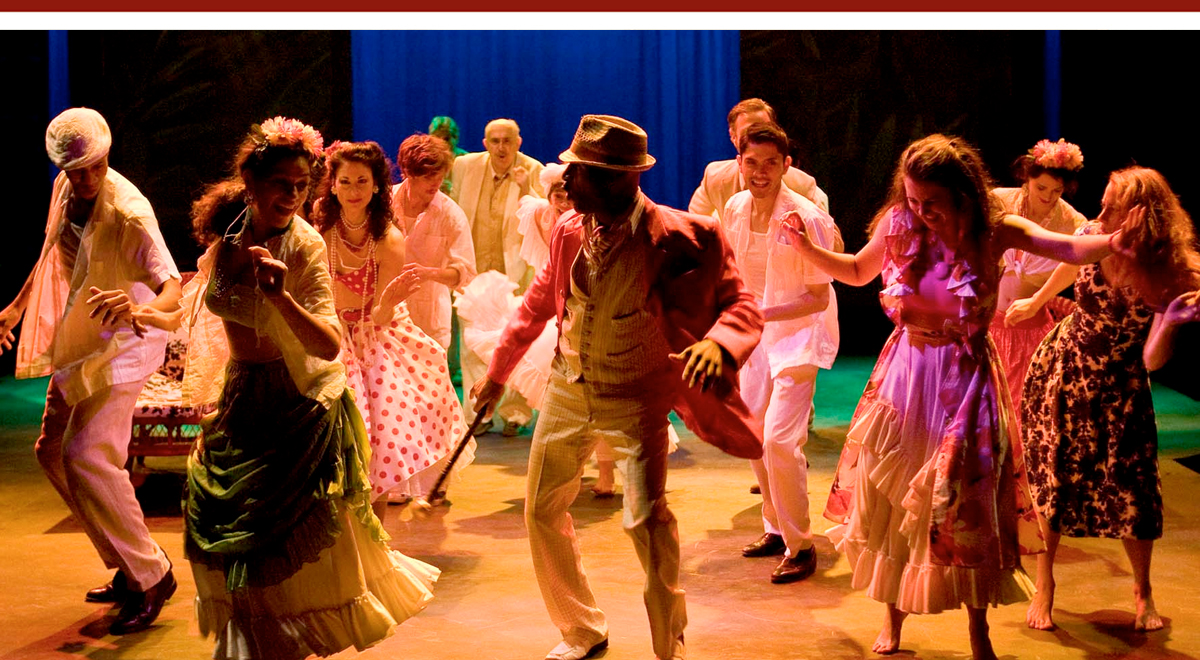NOVEMBER 2011
Click title to jump to review
PEACE IN OUR TIME by Noel Coward, adapted by Barry Creyton | Antaeus Theatre Company
RADIANCE: THE PASSION OF MARIE CURIE by Alan Alda | Geffen Playhouse
TWELFTH NIGHT by William Shakespeare | A Noise Within

Alternate ending
In the years after World War II, Playwright Noel Coward visited liberated Paris and found a more dispirited population than the one he'd left in bomb-scarred Britain. "I began to suspect, " he later wrote, "that the physical effect of four years intermittent bombing is far less damaging to the intrinsic character of a nation than the spiritual effect of four years enemy of occupation."
What emerged from the experience was Peace in Our Time, his two-act, 22-character vision of a post-war Europe in which a victorious Third Reich rules Britannia. Peace did poorly in its premiere and has proved prohibitive for theater-mounting ever since. Enter The Antaeus Company, which has been able to resurrect the labor-intensive drama with alternating casts from its deep ranks, and somehow shoehorn it into the Deaf West Theatre in NoHo (through December 18), where even a full house yields an imbalance of 23 people performing for 58.
Casey Stangl directs the new adaptation by Barry Creyton. Stengl has two casts, "Epps Cocoa" (reviewed here) and "Stubbs Special" (named for beverages referenced in the play), studded with local favorites like JD Cullum, Ann Noble, Rob Nagle, Zoe Perry, and Phil Proctor and Melinda Peterson, The casts alternate, with occasional individual swap-outs (indicated in listing at right) noted on cartes du jour program inserts.
The title recalls Neville Chamberlain’s 1938 declaration that the Munich Agreement he had just signed with German Chancellor Adolph Hitler had secured peace between their countries. Chamberlain's diplomatic coup turned out to be toothless as Hitler quickly plowed into neighboring nations. The play was also inspired in part by a short story by one of Coward's favorite writers, H.H. Munro's "When William Came," a novella that imagined a similar historic switcheroo after World War I.
The story spans a good part of the 1940s, introduced with newsreel footage and a date projected above the proscenium that frames Set Designer Tom Buderwitz' finely drawn London pub. The revision of history begins immediately. with Germany winning the months-long "the Battle of Britain," the massive German air campaign that had in fact been repelled by the Royal Air Force. From there, it's only a matter of time before the Nazis run the country. The uneasy relationship between the British and their occupiers is reminiscent of the tense atmosphere in Rick's Cafe American in the film Casablanca, with an English version of the sycophantic Vichy.
Coward's plot is predictable, and Creyton honors the original broad character-canvas as best he can, removing, as he has said, "40 minutes of dialogue . . . and 12 characters." However, there is still a sense that we could know these individuals better to become more concerned for their welfare and experience greater tension and suspense. Creyton's inclusion of a half-dozen Coward tunes, which was part of the original concept that former Artistic Director Jeanie Hackett had, also interferes with the play's forward drive. That said, there are other rewards in such an estimable cast, and the musical numbers – which either erupt spontaneously from the drinkers, or are a device to cover set alterations, are worth the trade-off. Two or three old torchers are exquisitely rendered by Raleigh Holmes.
Shattuck's pub (Steve Hofvendahl and Lily Knight play the owners in this cast) serves as a meeting place for a cross-section of occupied London. There is the Vichy-like opportunist who collaborates with the Germans (Cullum), a fiery woman ready to challenge the new authority (Emily Chase), and a wealth of weathered habitues. They fill the production with memorable performances, notably Hofvendahl as the bar owner,who has an uncanny British accent.
Some of the regulars gradually surface as part of an underground, and as they secretly listen to forbidden broadcasts by expatriots who are mounting a rebellion in other countries, they seize their opportunity to begin eliminating the invaders. Jason Henning brings dimension to his role as the main German authority – firm, authoritative and yet merely performing an uncomfortable duty.
After the play's unsuccessful premiere, Coward wrote to a friend that he supposed "the public really don't feel like seeing anything serious at the moment and I must say I can't blame the poor sods." As often happens, audiences saw the content and not the intent. Why would the still-bomb-addled Brits want to imagine themselves under the yoke of a victorious Reich? But Coward was actually writing a commendation of "the spirit of the British people" and railing against "the way they had been let down by the promises of their leaders in those immediate prewar years and how their spirit would always ultimately triumph – even if they had actually lost the war." as Barry Day writes in The Letters of Nöel Coward.
It's getting to the point that we can start saving space by simply saying Buderwitz designed the set. When it comes to realistic recreations, he is one of California's most dependable and resourceful. Adding just the right amber glow is lighting designer Jeremy Pivnick, while sound designer John Zalewski and costumer Jessica Olsen contribute wonderful period music and costumes.
This is a case where the production endears the viewer more than the play. It’s another debt-defying act of valour by Antaeus, and that defiant stand adds extra enrichment to the portrayals, as the financially strapped acting troupe steps in to revive the "spiritually damaged" characters in Shattucks’ London outpost.
top of page
PEACE IN OUR TIME
by NOEL COWARD
adapted by BARRY CREYTON
directed by CASEY STANGL
musical direction by RICHARD LEVINSON
ANTAEUS THEATRE COMPANY
October 21-November 12, 2011
Opened 10/21, rev’d 10/30m; extended to 12/18
EPPS COCOA CAST John Allee (in for Richard Levinson), Kendra Chell, Emily Chase, Chris Clowers, John Combs, JD Cullum, Paul Culos (in for Jesse Sharp), Etta Devine, Drew Doyle, Joseph Fuhr, Belen Greene (in for Joanna Strapp), Christopher Guilmet, Graham Hamilton, Jason Henning, Steve Hofvendahl, Raleigh Holmes, Danielle K. Jones, Lily Knight, Peter Larney, Zoe Perry, Melinda Peterson (in for Susan Boyd Joyce), Brian Tichnell, Amelia White
STUBBS SPECIALS not mentioned as replacements above Daniel Bess, Bill Brochtrup, Josh Clark, Mark Doerr, Karianne Flaathen, Eve Gordon, Anna Mathias, Rosalyn Mitchell, Rebecca Mozo, Rob Nagle, Ann Noble, John Francis O'Brien, Philip Proctor, Brian Tichnell, Rebekah Tripp, Patrick Went-Wolff, Abby Wilde, Buck Zachary,
PRODUCTION Tom Buderwitz, set; Jessica Olson, costumes; Jeremy Pivnick, lights; John Zalewski, sound; Lara E. Nall, stage management
HISTORY World premiere in 1947 at London's Lyric Theatre, directed by Alan Webb.
JD Cullum, at left
Geoffrey Wade
It's elemental
It begins as the story of a brilliant woman battling the male scientific community for recognition, but mutates into the story of her battle for another woman's husband. We know Marie Curie triumphs in the first matter, because she is renowned a century after the play takes place as the pioneering physicist who discovered radium and became the first person to win two Nobel prizes. She remains the only winner in different fields.
But the second battle proves more troublesome, both for her continuing work and for Alan Alda's new work, Radiance: The Passion of Marie Curie, now in an extended world premiere (through December 18) at the Geffen Playhouse.
Radiance furthers Alda's efforts on behalf of science and scientists.A decade ago he created a stage portrait of Nobel Prize-winning physicist Richard Feynman in Peter Parnell's QED. He had an 11-year run as host-reporter of PBS' "Scientific American Frontiers" before serving as host of PBS' "The Human Spark" last year. And even "Hawkeye" Pierce on TV's "M•A•S•H," the role that launched his fame 40 years ago, arguably could be credited with putting a human face, albeit a wise-cracking one, on the science of battlefield medicine.
Here he reanimates the historic figure he describes in a program interview as "my own personal hero." He focuses on the first decade of the 20th Century, when Polish-born Marie Skłodowska Curie (Anna Gunn) and her French husband, physicist Pierre Curie (John de Lancie), were breaking pitchblende into its components, and discovering that two – bismuth and barium – not only had the most radioactivity. but yielded two new elements that they named 'Polonium' and 'radium,' respectively.
Pierre loves his brilliant wife and treats her as his equal, but when their efforts lead to the 1903 Nobel Prize for Physics (which they shared with Henri Becquerel), Marie is snubbed by the president of the Royal Swedish Academy of Sciences, Dr. H.R. Tornebladh (Leonard Kelly-Young), who only allows the men on stage to accept the award.
The Curies raise their children (including daughter Irène Joliot-Curie, who, in 1935, will become the next woman to win a Nobel Prize), slave away in a lab contaminated by radiocative materials, and socialize with a circle of close friends. These scientists and their spouses include Emile Borel (Hugo Armstrong) and his wife Marguerite (Natacha Roi), and mathematician Paul Langevin (Dan Donohue), a former student of Pierre's, and his wife Jeanne (Sarah Zimmerman). In April 1906, Pierre walks in front of a horse-drawn wagon and is run over, plunging Marie into widowhood – and depression – at 38. Langevin becomes her emotional support as he steps in to help with her work. Jeanne, already bitter that her husband pursues research instead of something lucrative, brutalizes him.
Alda sticks to historical fact, echoed in Barbara Goldsmith's Obsessive Genius: The Inner World of Marie Curie. Romance develops between the brow-beaten mathematician and the lonely widow. Though, according to Goldsmith, it only lasts a year, it becomes a scandal that the Nobel Prize committee uses to deny Curie her second Nobel Prize in 1911. She perserveres, however, and accepts the award.
Of the elements Alda brings to Radiance – history, structure and language – the first remains solid while the others, at this stage, feel less complete. Structurally, the play is overburdened with presenting Jeanne's actions. Her complex, even psychotic, relationship with her husband ("estranged" husband, according to Goldsmith) is intriguing. But as it is, she remains one distractive note, and her repeated appearances just impede the play's drive. She is an external force to the story of Curie's passion: the foil. And just as in chemistry, foil should not be mistaken for a major element.
The threat she poses needs to be presented through Curie's responses, with Langevin or Emil or Marguerite, or in the device of speaking to her departed husband, something that is introduced and not overdone. That leads to the question of language. For the most part, the language is functional, but does not sparkle. A notable exception is a lovely passage when a reporter (Young-Kelly) compares a Paris basilica with the Eiffel Tower. It shows Alda's ability to engage the ear, keeping it real with minimal ornamentation.
Anna Gunn, who last worked here with Sullivan to launch Donald Margulies' Time Stands Still, has found a niche among television's best work, notably "Deadwood" and "Breaking Bad" (which, coincidentally, shares a periodic-table-inspired title treatment with Radiance). But her stage work continues to set her apart. Her creation of Bekka in a reading of Rabbit Hole has never been topped, and this role, especially with any tinkering Alda does to reach a more emotional climax, could rank among her best. Among the other A-list company members, Donohue is beautifully tortured, de Lancie delightfully stentorian, and Armstrong and Young-Kelly, add depth while looking as if they stepped out of a 1903 daguerreotype. Both Roi and Zimmerman are excellent, although in Daniel Ionozzi's overall dark lighting, required for the continual projections, Rita Ryack's similar dresses for the similarly bewigged women require a moment to sort out who is who.
Still, it's unlikely there has ever been a more brilliantly conceived and elaborately executed physical production in the Geffen's smaller Audrey Skirball Kenis Theatre. The upstage wall Thomas Lynch has provided for projection designer John Boesche's (sometimes animated) images allows Boesche to transform the stage from a cave-like lab, to a library of books carved of coal, to lush exteriors streaked with pitch, and the Nobel ceremony audience of stone-faced men. Kudos to Stage Manager Young Ji for precision cue-calling.
Within days of opening, the play had extended two weeks. That's a tribute to the woman at the heart of the story, the wherewithal of one of America's great directors to execute such a demanding staging, and a playwright passionate about his subject.
top of page
RADIANCE: THE PASSION OF MARIE CURIE
by ALAN ALDA
directed by DANIEL SULLIVAN
GEFFEN PLAYHOUSE
November 1-December 11, 2011
Opened 11/9, rev’d 11/10
CAST Hugo Armstrong, John de Lancie, Dan Donohue, Anna Gunn, Leonard Kelly-Young, Natacha Roi, Sarah Zimmerman, u/s Eric Curtis Johnson, Helen Sadler, Don Oscar Smith
PRODUCTION Thomas Lynch, set; Rita Ryack, costumes; Daniel Ionazzi, lights; Jon Gottlieb, sound; John Boesche, projections; Young Ji, stage management
HISTORY Edgerton Foundation New American Play Award recipient. World Premiere
Anna Gunn, John de Lancie
Michael Lamont
A Will, a way
A day after the premiere of Anonymous, a dubious big-budget film contesting the authorship of Shakespeare’s plays, one of those disputed plays launched a new era in Los Angeles theater. With Twelfth Night, A Noise Within opened its custom complex in Pasadena, a dozen miles from the Glendale hall it had rented for its first 20 seasons.
As the $30-million film’s prospects splintered upon dismissive reviews, the $13.5 million theater was christened by an overflow opening night crowd that required a back row of folding chairs to increase the 283-seat capacity.
Founding artistic directors Julia Rodriguez-Elliott and Geoff Elliott had as much to be proud of as grateful for. Their core acting company took the key roles and infused the production with both playfulness and confidence. Their professional dedication had inspired supporters to donate despite a searing recessionary climate that made funding pools as rare as desert oases. Their personal modesty inspired some to take their program recognition as "anonymous."
They had opened on time and without a visible snafu, personally handling much of the donor-massaging, last-minute crises, and media servicing while she directed and he played the hefty role of Malvolio. Not surprisingly, the biggest hand of the evening went to Rodriguez-Elliott, who approached the stage for some pre-show acknowledgements as polite applause swelled into a lengthy standing ovation.
Written to be performed on the last day of Elizabethan England's Christmas observance, Twelfth Night is a comic revel that lends itself to singing, dancing and the kind of holiday processions that mark the last days before Lent. The play’s isle of Illyria has moved to Cuba, where Doug Newell’s sound design, Kurt Boetcher’s palm-dotted set, Ken Booth’s tropical lights and gobos, and the cool whites in Angela Balogh Calin’s breezy costumes provide backdrop for Rodriguez-Elliott's choreography, usually led by the character of Feste (Anthony Mark Barrow).
A shipwreck has washed Viola (Angela Gulner) onto the strange island and separated her from her twin brother. A local sea captain (Mitchell Edmonds) explains the lay of the land and the state of its governor, Duke Orsino (Robertson Dean), who lives nearby with his sister (Jill Hill). Viola, disguised as Cesario for safety, visits the Duke and finds him just as the captain warned, heavy with unrequited love for the neighboring noblewoman Olivia (Abby Craden). Orsino enlists Cesario's help for his hopeless cause. But so earnestly does Cesario deliver Orsino’s message that Olivia is smitten with the messenger, and begs "him" to visit her again. When Viola informs the Duke, feelings for him fill her heart.
While Orsino mopes and Olivia dotes, her uncle, Sir Toby Belch (Appollo Dukakis), along with his friend Andrew Aguecheek (Jeremy Rabb) and his servant Fabian (Max Lawrence) join Olivia’s gentle-woman, Maria (Deborah Strang), to publicly humiliate Olivia’s steward, Malvolio, whose pompous ways have become unbearable.
Elsewhere, Sebastian (Max Rosenak), with the help of another local sea captain, Antonio (Stephen Weingarten), makes his way to Olivia’s residence just in time to be mistaken for Cesario. Shakespeare milks the mistaken identities for all they're worth, until Viola is forced to reveal her true identity along with her true feelings for Orsino. Olivia is now overjoyed to have in Sebastian a Cesario lookalike who is more than happy to accept her advances.
An occasion such as this, where the production is part of a larger theatrical landmark, provides a special chance to relish a resident company. Among the standouts are Strang, adding depth to the conniving Maria, Dukakis as an appropriately fumbling Belch, Dean, with the right detachment of a man out of sync with love’s folly, while Craden is a delightfully obsession-worthy Olivia.
The rule of thumb is that a theater company takes a few productions to adapt to a auditorium. A Noise Within has kept the full-thrust configuration of its Glendale stage, while opening up the seating area for better legroom, sightlines and comfort. That may be why this production, though not destined to rank among its great stagings, still feels well-executed, especially for the first time in the new space. The Elliotts and company have hit the ground running. The future of classics theater in L.A. has begun. As Orsino says, "Play on!"
top of page
TWELFTH NIGHT
by WILLIAM SHAKESPEARE
directed by JULIA RODRIGUEZ-ELLIOTT
A NOISE WITHIN
October 21-November 12, 2011, 2011
Opened, rev’d 10/29
CAST Anthony Mark Barrow, Abby Craden, Robertson Dean, Apollo Dukakis, Mitchell Edmonds, Alison Elliott, Geoff Elliott, Angela Gulner, Jill Hill, Max Lawrence, Jeremy Rabb, Max Rosenak, Deborah Strang, Steve Weingartner, and Patrick Connolly, Alex Galicia, Diana Gonzalez-Morett, Heather Roberts, Simmin Yu
PRODUCTION Kurt Boetcher, set; Angela Balogh Calin, costumes; Ken Booth, lights; Doug Newell/Zipline Sound, sound; Ken Merckx, fights; Angela Fong, stage management



